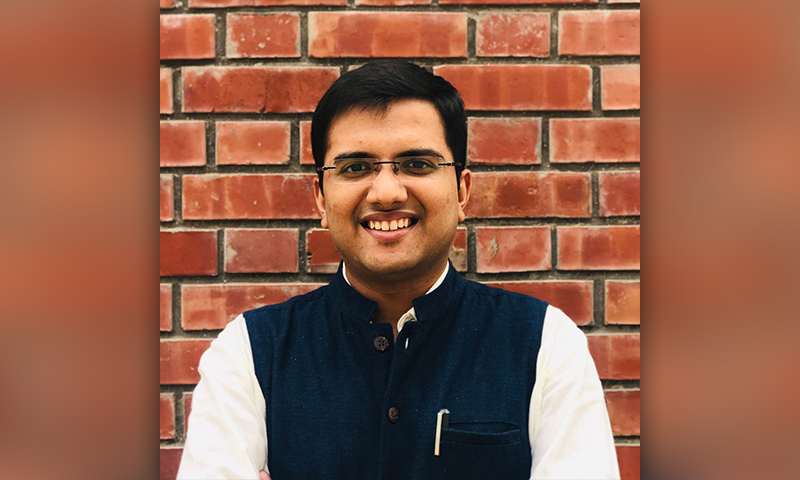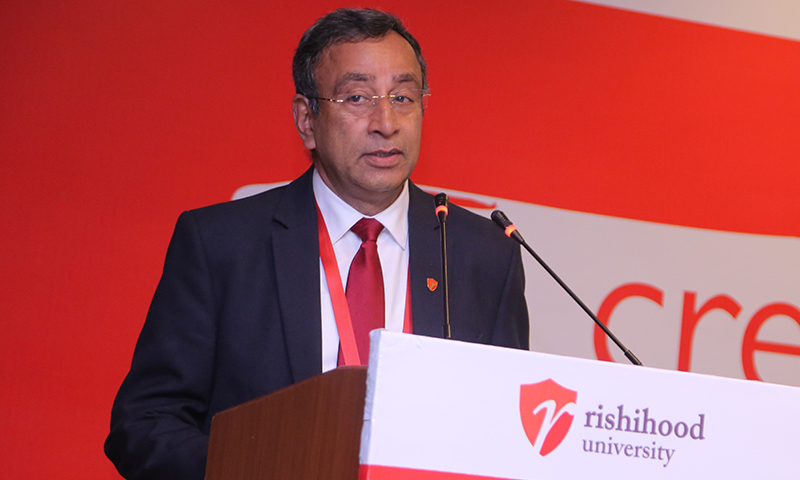The beginning of the year 2020 does not look promising for the job aspirants across the country. State Bank of India estimates that India will create at least 1.6 million fewer formal jobs across government and low-paying sectors, a segment that typically absorbs some of the millions of youth entering the world’s biggest workforce each year. However, Sahil Aggarwal, who is the Co-Founder and CEO of newly established Rishihood University in Sonipat, Haryana, is confident that the country will soon recover from this crisis. He says, “It is normal for any economy to go through structural shifts in 15 to 20 years duration. The current shift is due to disruptions being caused by the technological breakthroughs taking place in the world. This change is having an impact on the kind of skills that are necessary for the new jobs that are being created.”
While the Government through Skill Council of India and other government-sponsored programs are doing their bit to overcome the job crisis, there is a need for universities, colleges and educational institutions to train students in the new type of skills that are required for the jobs created in the new economy of India. Unfortunately, this process has been slow and has not been able to move at the speed required due to excessive regulatory control. “If universities and educational institutions become free from the shekels of control, they would be able to meet the market needs at a faster pace. I expect these shortages to continue for the next five years when we will begin to see adjustments taking place in the market,” pinpoints Aggarwal.

Located in Sonipat, the ‘hub for higher learning and research’, Rishihood University, with a vision to reimagine higher education in India for the next 100 years, aims to integrate lifelong learning transcending age, subject choice, and society by closely working with school students, individuals pursuing higher education and working professionals. Aggarwal, who also serves on the board of Vision India Foundation and the Rashtram School of Public Leadership has brought together an esteemed panel of advisors to help tackle asymmetry between learning and employability. “We are creating a learning environment that inspires people to achieve ‘Rishihood’. Our programs and projects are being designed so that each person associated with the university is motivated to contribute to society in a positive way. At Rishihood University, we believe that we cannot educate students in isolation. For holistic development, students should be exposed to all possible disciplines,” explains Aggarwal.
Rishihood University is developing an ‘ecosystem’ approach to learning rather than isolated training and research, which actively engages and nurtures a conducive environment for our academic areas as well as for the larger growth of the nation and society. Some of the esteemed board of advisors of the University include Ajay Gupta, CEO of Bachpan Play Schools (chain of 1000+ playschools) and Academic Heights Public Schools (chain of 100+ formal K12 schools), Maj General (retd) DN Khurana who also continues to be on the board of Indian Institute of Management (Lucknow), Dr. Harsh Mahajan, Padma Shri awardee and the President of the Indian Radiology and Imaging Association (IRIA). The university has also brought in Dr. Kamlesh Misra, a well-known and reputed strategist and innovative leader in conceiving, organizing and managing educational and research organizations, as the Vice-Chancellor. He already has the distinction of being the founding Vice-Chancellor of Auro University, Surat as well as the Vice Chancellor of Ansal University, Gurgaon.
“Academic topics do not develop in isolation. Knowledge is integrated and interdisciplinary. We prepare our learners to think holistically and provide a learning environment closer to real life,” opines Dr. Kamlesh Misra. Rishihood University believes in four kinds of interactions in academic disciplines to provide a holistic learning environment: Crossdisciplinary (viewing one curricular subject from the standpoint of another, like economics of music), Multidisciplinary (the combination of several content areas that are concerned with one problem, but without intentional integration, like intellectual property law and food technology), Plurdisciplinary (the combination of content areas that are somewhat related, like food and agriculture) and Transdisciplinary (beyond the scope of the disciplines; that is, to start with a problem and bring to bear knowledge from the disciplines). “Our schools are being established in a way that encourages all the four kinds of interaction and can collectively bring a larger impact,” shares Dr. Misra.
The Modern Gurukul
Rishihood University believes in the philosophy of the Gurukul System, where a learning system is created and centered around the students. Here, everyone in this system is a learner, some at the basic level of understanding and others at a very advanced level. They all work together to create a curious mind which is in search of a deeper meaning of the subject and life in general. “Every student is important and we ensure that no one is left out from the process of change taking place. Teachers are role models where students see them working hard with them to ensure good learning and by engaging them through a hands-on process,” states Dr. Misra.
Rishihood is a new concept in higher education and everything that is done on the campus is centered around the student community. “We are on a mission to bring about a major transformation in the thinking of our students by focusing on two major elements. The first being the training of the mind, and the second is the focus on character building. These two elements result in four different types of outcomes which are essential for the future of our youth and their careers,” explains Dr. Misra. Acquisition of knowledge and understanding are essential components of success and Rishihood University. Its faculty, and its corporate affiliates work with students to ensure that they ignite the curiosity of the students to go deeper and deeper in search of new knowledge.

“It is important for our students to have the right attitude for success and we at Rishihood will work with students in groups and individually to help them approach life in a very systematic way, to understand our culture and society, to develop a sense of national pride, and have a balanced understanding of our rights and responsibilities as a citizen, says Aggarwal. Rishihood University believes that knowledge is not enough for success in the marketplace. Instead, it is their firm conviction in the ability of a student to convert his knowledge into marketable skills that will determine his future in the corporate world. The university has specific programs and training to ensure that all its students have the right set of marketable skills which can give them a good start in the corporate world. “Finally, all our students will have developed that ability to work hard and not look for the easy and shortcut processes to achieve anything in life. This is done through a process of mentorship, life lessons, corporate interventions, leadership speaking sessions, workshops and sharing real-life stories of successful entrepreneurs,” claims Dr. Misra.
At Rishihood University, students and faculty members work together on a project-based learning system. Besides the academic inputs, the university offers inputs of various types of career options and how students can achieve success in life. “We have set up a Career Support Center which has regular programs to polish their marketable skills, writing CVs, interview skills, aptitude test, and many other companies related inputs. Encouragement is the key to changing the mindset of students and getting them inspired,” explains Aggarwal. Indeed, when students get inspired, they become motivated to achieve their goals in life. Aggarwal adds, “We will have regular sessions on many of these aspects that will help our students become hard-working and go-getters.”
Seeking the Latest Knowledge
The faculty members at various schools at Rishihood University come from diverse backgrounds and essentially fall into three different categories. The first category is of those who come with hardcore research and teaching background and have an excellent academic record and credentials. They have several years of experience teaching nationally and internationally. Many of them are researchers and have an excellent publication record to their credit. Some of these faculty members are international faculty with years of experience. “We are expecting more overseas faculty members to join Rishihood University as we move forward with our plans,” shares Aggarwal.
The second category of faculty members are those that come from pure industry background but have been academically very strong with years of experience to their credit. Many of them have contributed to developing a new direction for the corporate sector. “We have identified senior members of the corporate world who have established startup companies and have seen them grow to become recognized brands,” claims Aggarwal. The third and the final category of faculty are those that are classified as flying faculty, who spend time for a certain fixed time period at Rishihood University teaching and supporting the students. Dr. Misra says, “Many of these flying faculty are international faculty and are teaching in universities in USA, UK, Australia while some of them are based in India. They deliver the courses in a modular format and are supported by the in-house full-time faculty members who also benefit and upgrade their teaching and delivery as per the international standard.
Rishihood faculty member will forge research alliance with the industry, work with students on industry-based projects, and spend time with industry mentors who bring to the university the latest developments of the corporate world. This ensures that the faculty members are updated with the latest trends in the industry. In fact, Industry-connect is an important aspect of the new-age higher education degree programs at Rishihood University. “We are building a network of corporate connect with the objective of not only having students do their training and placement but also to ensure that there is a good deal of knowledge sharing,” pinpoints Dr. Misra. The industry faces a number of problems that need immediate solutions based on research. Such research work that benefits the industry will be conducted at the various schools of the university and will involve high-quality researchers and students who will provide research-based solutions to the existing problems. For this purpose, Rishihood University is setting up the All India Researcher’s Home on the campus with all the facilities.
The University is also putting in place a system to receive research-based projects from the industry such as feasibility study, analysis of markets, pricing strategy, and helping in building prototypes for new products for the industry. “There is also a process in place to bring high profile speakers from the industry to share their experience and knowledge with students and faculty members. This is an important development in the area of higher education,” opines Aggarwal. Rishihood University has planned Executive Development Programs in collaboration with industry under the banners of the Corporate Knowledge Center at the campus.

Focusing on Innovation and Creativity
Students who are seeking higher education qualifications today are going to be living in a world that is going to be defined by innovation and creativity. “We at Rishihood University have taken steps and have put processes in place where we will support innovation and creativity at all levels. To us, innovation means invention and commercialization. This implies that inventions or ideas already exist but what is missing is our ability to commercialize that idea,” Explains Dr. Misra. To support and encourage innovation and creativity, Rishihood University has set up the School of Creativity and the School of Entrepreneurship for the first time in the country where students will work hand-in-hand along with their mentors from academics and the industry to identify a new or existing idea for the purpose of commercialization, design and develop prototypes, and work on creating new markets for their products and services.
Aggarwal pinpoints, “The most important aspect of this model is to help students understand that for any business to succeed it is important that there are paying customers for their ideas which get commercialized. Many times, this aspect takes a back seat in the planning process and the startup dies an early death.” The university has planned the delivery of the program in such a way that they can move students from a system of dependent memory to a system of independent thinking and problem-solving. Dr. Misra adds, “This is possible when we allow our students to go into a learning mode rather than the teaching mode of delivery. We have set up labs and studios which are designed to get the best of the creative thinking of the student.”
The School of Entrepreneurship at Rishihood University has been set up with a clear objective of creating a disruption in the field of entrepreneurship education. “Conventionally, entrepreneurship education in India has been just a simple MBA with a few courses in managing a family business and basic principles of entrepreneurship. We are introducing new age programs which differ both in content and delivery,” shares Dr. Misra. The objective of the MBA Entrepreneurship program at Rishihood is to prepare job creators for the new economy. This program is delivered in a format of an incubation process and Bootcamp delivery. Students will be required to register their startups by the end of the program. They will start from the process of generating a business idea where they spend considerable time in the idea lab with mentors and entrepreneurs and graduating to the stage of opportunity lab where they are able to test their idea before they move to the startup garage. “This is the stage when they actually begin to develop the design and the prototype of the product and finally move to the incubator where they have the office of the company and they begin to prepare for the start,” adds Dr. Misra. During this whole process of setting up their startup company, Rishihood will offer academic inputs to the students in a modular format and are structured in such a way that it coincides with the development process of their startups.
“The degree programs are delivered by faculty who come with extensive experience both in academics and from the industry. We will have a number of well-known successful entrepreneurs who will be part of the delivery of these programs. The school of entrepreneurship will also have both undergraduate and postgraduate programs and will allow students a fair degree of choice to take courses of their interests but relevant to their area of study,” concludes Aggarwal. Undoubtedly, Rishihood University is an institute to look upon in the futures, as it provides a very conducive environment for students to think outside the box and not use 20th-century solutions to solve the problems of the 21st century.

Sahil Aggarwal, CEO and Co-Founder
Sahil Aggarwal is a young dedicated educationist and social entrepreneur with a vision to transform India’s higher education ecosystem through ‘applied learning’ and ‘education for impact’. He is the co-founder of a number of institutions and initiatives such as the Rishihood University, Vision India Foundation and the Rashtram School of Public Leadership.
After graduating from IIT Delhi with a B. Tech in Mechanical Engineering, he co-founded Vision India Foundation, a nation-building initiative to create public leaders where he currently serves as its honorary director. He also serves on the board of Gateway Education. He has a keen interest in public policy, governance and diplomacy for which he also did a Masters in Diplomacy, Law, Business from O.P. Jindal Global University.

Prof. Kamlesh Misra, Vice Chancellor
Prof. Misra graduated with a Postgraduate Degree in Economics from Allahabad University, India. After completing his Ph.D. from Northeastern University, Boston, he taught there as a lecturer until 1990. He did his advanced training in Financial Management of Local and Regional Governments from Harvard Institute for International Development, Harvard University, Cambridge, USA under USAID funding. He served as an Economist at the Center for Social & Urban Research, Pittsburgh University from 1990 to 1994 when he returned to India to Join as an HDFC Associate Professor at the National Institute of Public Finance and Policy, New Delhi. As a member of the NIPFP team, he was the technical advisor to the First Punjab State Finance Commission.
Prof. Misra is known for creating some of the most successful business models in the education sector without compromising the ethical dimensions of teaching as a profession. He is a team builder and has created institutions that are talked about due to their work culture and the free environment for academic pursuits.




